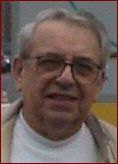|
|
 subscribe
subscribe
|
 subscribe subscribe
|

Remembering |
. . . . . . . . . . . . . . . . . . . . . . . . . . . . . . . . . . . . . . . . . . |
Remembering the Holocaust - Right Now
Story and photos by Suzanne La Barre, Alameda Sun newspaper, 26 May 2005. Reprinted without permission.
Temple Israel of Alameda hosted a Holocaust remembrance last Wednesday, May 18, to mark the 60th anniversary of the end of the Holocaust, the World War II genocide that killed six million Jews in Europe.
Five community members shared their chilling stories of survival, emphasizing the evening's theme, "Remembrance and Never Again." The event was part of a lecture series held each Wednesday at the temple.
Temple Israel of Alameda congregant Herbert Lewin, 85, escaped Nazi terror when he sought asylum in England and later the U.S. in 1941. He secured a job as a baker and sent his earnings to family members in Europe to fund their escape, he said. His attempt was futile, however. The Nazis had already launched their grand scale internment and extermination of Jews across the country.
"My sister, six years younger than me ... I was supposed to get her out, but she unfortunately perished and my parents and unfortunately everyone else in my family," he said.
Lewin spoke about his Holocaust experience for the first time in public that evening, he told the audience of roughly 30 community members.
"Losing my family, it worked on me until I broke down one day and I didn't want to live anymore," he said. He spent a year in and out of a psychiatric hospital, sometimes visiting four doctors a week. Not until he had a family of his own did he recover, he said.
"My kids were my salvation, they made me forget my past," he said.
As Nazi dictator Adolf Hitler rose to power, temple member Gretel Gates, 85, and her family took flight for the U.S. in 1937. European friends and family insisted they were crazy to pack up their belongings, she said; no one expected the mass murders that would ensue.
Less than a year after their departure, Nazis wreaked havoc on Jewish neighborhoods in Germany, burning synagogues, ravaging businesses and beating, raping and killing residents. The now infamous event, Kristallnacht ("The Night of Broken Glass"), is generally considered the dawn of the Holocaust.
By the time the war ended, "Ninety percent of them died," Gates said.
Later he found out that, "We were being sent by Nazis to the Bavarian alps to be shot because they didn't want the Americans to see us as we were -- skin and bones," he said.
The Nazis didn't fulfill their goal of total annihilation. Sattler and a few remaining survivors were liberated by Americans in 1945. He was immediately expedited to a hospital where a doctor told him, "According to what I learned in medical school, you should be dead but I'm talking to you so you must be alive," Sattler said.
Like Lewin, all of Sattler's family perished, save a first cousin whom he located two decades after the war. And for many years, Sattler, like many who lived through the genocide, declined to discuss it.
Following a Holocaust symposium in 1982, however, he opened up to other survivors and his family, he said. He has since actively taken part in educating young people about the Holocaust.
Sattler is a dying breed. Most survivors are in their 70s, 80s or beyond and few are left, said Temple Israel of Alameda Rabbi Allen Bennett.
"The survivor community is disappearing," he said. "Those who want us to remember 'never again' will not be with us as long as we'd like them to be. So the message they bring to us is one we're going to have to do something about, not just listen to."
Bennett spoke of "Hotel Rwanda," the feature film based on the real life modern genocide in which more than one million Rwandans were systemically murdered in the span of three months.
He said, "For those of us who look at posters and fliers and bumper stickers that say never again, perhaps we should paste over those and say right now."
|
| Have you found errors nontrivial or marginal, factual, analytical and illogical, arithmetical, temporal, or even typographical? Please let me know; drop me email. Thanks! |